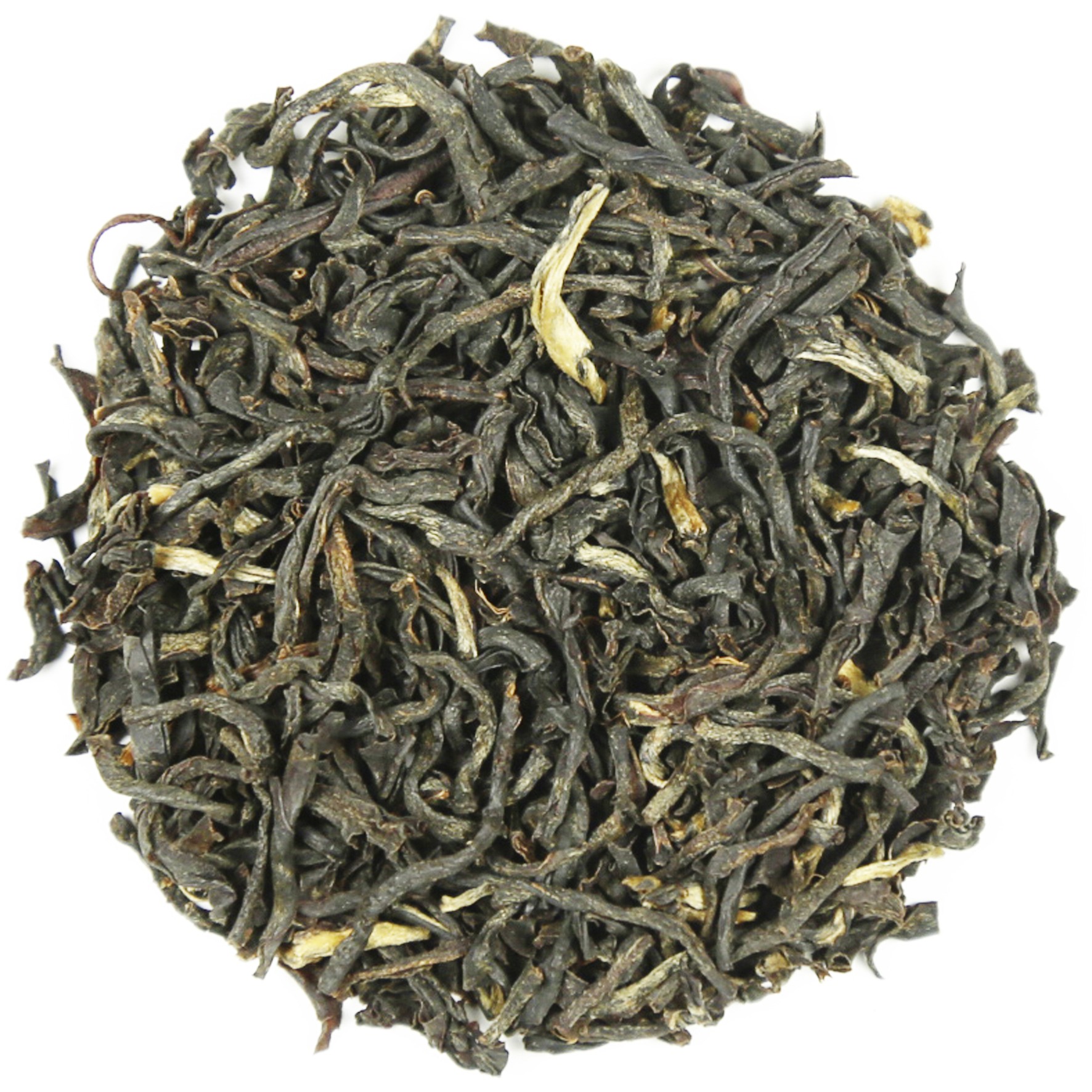Black Tea Brewing Guide

1 Teaspoon
Add 1 teaspoon per person and one for the pot.

95⁰c - 100⁰c
Boil using fresh water, at a temperature of 95⁰ - 100⁰c.

3 - 5 Mins
Steep for 3-5 minutes, depending on personal preference
About Product
-
Product Description
Assam Tea Dekorai Estate TGFOP comes from the famous northeast Indian garden of the same name. The term “TGFOP” stands for “Tippy Golden Flowery Orange Pekoe”, denoting leaves containing a high content of golden tips.
Furthermore, it consists of the top bud and the first two leaves of each new shoot. The bottom line is that it is of the best quality around, all the while tasting malty and sweet.
Dekorai Estate in Assam, India
This Tea Estate lies on the broad plains surrounding the Arunachal hills on the north banks of the mighty Brahmaputra river. Its name derives from the Dickori river, a tributary of which skirts the western peripheries of the garden.
Situated 78.33 metres above sea level, Dekorai has garnered an outstanding reputation producing mid-season harvests. Such is the case with Assam Tea Dekorai Estate TGFOP.
Is There Caffeine in Assam Dekorai Tea?
Caffeine is a stimulating chemical compound found in approximately sixty plants. This includes Coffea (Coffee) and, of course, Camellia sinensis (Tea). But it’s not quite as simple as that.
Four primary Types of Tea – Black, Green, White and Oolong – come from the plant, with each variety undergoing varying amounts of oxidation. This infusion has undergone the most and, therefore, contains 45-mg of caffeine.
How to Make Assam Dekorai Tea
1. Put Loose Tea into a Filter or Infuser.
2. Place the item in a cup or mug of your choice.
3. Pour freshly boiled water at 100°C over the leaves.
4. Allow it to steep for 3-5 minutes for the best flavour.
How to Serve: Consider adding milk or milk alternatives, sugar, honey or lemon. Alternatively, serve black.
Tasting Notes: A light and sweet Assam Tea with malty notes and a honeyed aroma.
Benefits of Assam Dekorai Estate Tea TGFOP
Experts have become increasingly interested in Tea leaves and their reported medicinal qualities, Assam Tea Dekorai Estate TGFOP among them. It is an infusion brimming with beneficial antioxidants.
Antioxidants have the capacity to neutralise free radicals in the body, in turn the product of natural, though harmful, human oxidation. Doing so reduces the risk of developing numerous chronic conditions.
But that’s not all on offer here. It turns out that frequent consumption can likewise improve oral health. The answers come from a collaborative study conducted at the University of Iowa, USA, and the Institute of Odontology at Göteborg University, Sweden.
Scientists concluded that the more people drank, the more their bacteria and plaque levels fell due to the polyphenolic compounds in Black Tea.
There is also evidence to indicate that a cuppa supports the immune system. One study published in the Proceedings of the National Academy of Sciences can back the claim.
It discovered that Black Tea boosted the body’s defences against infection while priming the immune system to attack invading bacteria, viruses and fungi. What could be better than that?
-
Delivery Information
We offer reliable delivery services through Royal Mail to ensure that your orders reach you on time.
Here are the main points you should be aware of:
- Standard UK Delivery: £3.95 excluding delivery charge.
- Delivery Times: Orders are processed and dispatched within 2-5 working days but they may take longer during busy times. It is worth noting that all our orders are packed by hand in order to maintain the quality.
- Free Delivery: We are delighted to provide free shipping for UK orders over £35*. Moreover, customers from Europe can enjoy free shipping for any purchase above €75*. Furthermore, we offer free delivery in the USA for all purchases exceeding $125*. Please note terms and conditions may apply.
- Tracking: When your package is sent you will receive a tracking number via email so as to keep tabs of its progress.
International Shipping
We do ship worldwide meaning our products can be accessed by anyone around the world.
Here are some important details:
- Delivery Times: International deliveries vary based on destination, generally taking between 7-14 working days.
- Shipping Costs: International shipping costs are calculated at checkout based on your location and weight of your order. View full delivery charges for your location.
- Customs and Import Duties: Remember customs or import duties may exist depending on regulations in your country; these charges are borne by the customer.
Returns Policy
Your satisfaction is our top priority, however if for any reasons you’re not completely happy with your purchase, simply follow our returns procedure:
- Eligibility: Items returned within 30 days of receipt must remain unopened and in their original condition.
- Process: In order to return an item contact our customer service department using your unique order number after which detailed instructions will be given concerning returning them back to us securely.
- Refunds: Our aim is to refund you within 5-7 working days upon successful reception of returned goods. The refund amount will be credited to your original payment method.
For any other Enquiries or help please contact our Customer Support Team always at your service.
-
Product Reviews

 Loose Leaf Tea
Loose Leaf Tea Pyramids
Pyramids Tea Bags
Tea Bags Africa
Africa Assam
Assam Ceylon
Ceylon Chinese
Chinese Darjeeling
Darjeeling European
European Indian
Indian Japan
Japan Nepal
Nepal South East Asia
South East Asia Ayurveda Tea
Ayurveda Tea Black Tea
Black Tea Chai Tea
Chai Tea Flowering Tea
Flowering Tea Fruit Tisanes
Fruit Tisanes Green Tea
Green Tea Herbal Tea
Herbal Tea Matcha Tea
Matcha Tea Oolong Tea
Oolong Tea Organic Tea
Organic Tea Pu erh Tea
Pu erh Tea Rooibos Tea
Rooibos Tea White Tea
White Tea Asian Coffee
Asian Coffee Caribbean Coffee
Caribbean Coffee Central American Coffee
Central American Coffee South American Coffee
South American Coffee Coffee Blends
Coffee Blends Decaffeinated Coffee
Decaffeinated Coffee Espresso Coffee
Espresso Coffee Ethically Sourced Coffee
Ethically Sourced Coffee Flavoured Coffee
Flavoured Coffee Organic Coffee
Organic Coffee Single Origin Coffee
Single Origin Coffee Chocolate 1
Chocolate 1 Chocolate 2
Chocolate 2 Chocolate 3
Chocolate 3 Chocolate 4
Chocolate 4 Chocolate 5
Chocolate 5 Chocolate 6
Chocolate 6 Chocolate 7
Chocolate 7 Chocolate 8
Chocolate 8 Chocolate 9
Chocolate 9 Loose Tea Filters
Loose Tea Filters Tea Accessories
Tea Accessories Tea Bricks
Tea Bricks Tea Caddies
Tea Caddies Tea Caddy Spoons
Tea Caddy Spoons Tea Gift Ideas
Tea Gift Ideas Tea Infusers
Tea Infusers Tea Strainers
Tea Strainers


